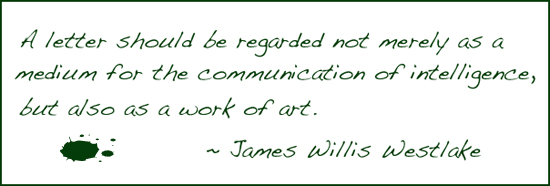Write a better letter. Today we text and tweet and update and email and vmail and blog and vlog, but we don’t write enough letters. Or even notes. With paper and ink and stamps.

James Willis Westlake on how to write a better letter
Digital communications are proliferating. Children can type before they can handwrite, thumb-text before they can thumb-hike. (Remember hitch hiking? It’s sort of similar to bell bottoms and vinyl albums. All three will be cool again, mark my words.)
I have a special soft spot for the lost art of letter-writing — an art robbed of romance and even basic courtesy in the age of rapid-fire, efficiency-obsessed, typed-with-one-thumb-on-a-tiny-keyboard communication. ~ Maria Popova (Brain Pickings)

How to Write Letters, by James
Willis Westlake (archive.org)
While I’m no Luddite and I’m not proposing a ban on day-in, day-out digital communications, I am challenging you to write a better letter. A better love letter, cover letter, resignation letter, condolence letter, congratulations letter,…
I’m not talking about the glut of letter writing tips available online or even this refreshing tutorial: “to write a better letter, go fly a kite“. Sure there’s still room for James Willis Westlake’s How to Write Letters: A Manual of Correspondence, Showing the Correct Structure which I discovered via the perennially plugged-in and chronically contemplative Maria Popova’s post. (Check out her post, “How To Write Letters: A Guide to the Lost Art of Epistolary Etiquette circa 1896“.) There is still room, ample room, in fact. But that’s not what I’m talking about.
I’m talking about how to compose better personal, handwritten notes and letters. You dig? (That’s a bell bottom, vinyl album, hitch hiking way of asking if you understand me so far.) Here’s how to write a better letter.
Write with a Pen
Handwriting, even when it’s smudgy or loopy or crossed out or misspelled is real. And we crave real, now more than ever. Use a pen to write a better letter. It will look and feel and smell and maybe even taste like you. Well, probably it won’t taste like you, but who’s checking? Your ink-written letter will become slightly unintelligible when the recipient is so moved that s/he sheds a tear. Splash. A blurred word or two. Forever. This is good. It permits the recipient to imagine whatever words they want to imagine in your letter. This is subversive. But it is good. Very, very good!
Write with a Pencil
Scared $#!%less of the pen’s permanence. I know, it takes bravery. Or abandon. But don’t worry. You can still write a better letter even if you’re daunted by indelible pen and ink. Use a pencil to write a better letter. Yes, you can erase and rewrite and waffle, but it’s still pretty darned real. Intimate even.
Cross Out & Correct

A Better Letter?
Leave evidence that you are fallible, that you changed your mind, that your emotions and memories are forever evolving. Don’t hide your edits. Include them. They are part of the story. Part of you. Especially if they embarrass you. Digital communications are like airbrushed posters. Slightly fake. Only, its hard to be certain which part is fake and which part is real. That’s not cool. Real is cool. Marginalia is cool. Open up and share!
Doodle
Don’t take yourself so seriously. Especially if it is a serious letter. Levity is the best therapy. And it’s enjoyable. Doodle even if you are totally self conscious about your artistic abilities (or lack thereof). Actually, doodle especially if you are self conscious about your artistic disabilities. It’s humble. It’s trusting. It’s generous. And it gets easier each time you try. You might even find that you are a natural doodler. I think we all are!
Write Often
Practice makes perfect. Familiar? What about this? Practice gets monotonous. We extol the virtues of practice, practice, practice, and in the process I’m afraid we sometimes stifle enthusiasm and teach risk aversion. Writing (and actually mailing) a letter is still practice. But it’s also exciting. And a wee bit risky. Did we make a mistake? Did we go too far? Did we not go far enough? And it will inspire you to fire off another letter. Write often. Practice will absolutely make you a better letter writer, but remember to send out the letters you write. Write often. Send often. Become a better letter writer!
If you’re not quite ready to practice on your near and dear (I’m thinking of the pencil letter writers) you might want to check out Mike O’Mary‘s note project which would be the perfect way to practice by sending letters to perfect strangers!
The Note Project is an ongoing campaign to make the world a million times better by inspiring people to share notes of appreciation. (The Note Project)
Go. Write. Now!
Related articles
- Six tips for writing a love letter (onewildword.com)
- Hannah Brencher on Letters, Strangers and Love (virtualdavis.com)






